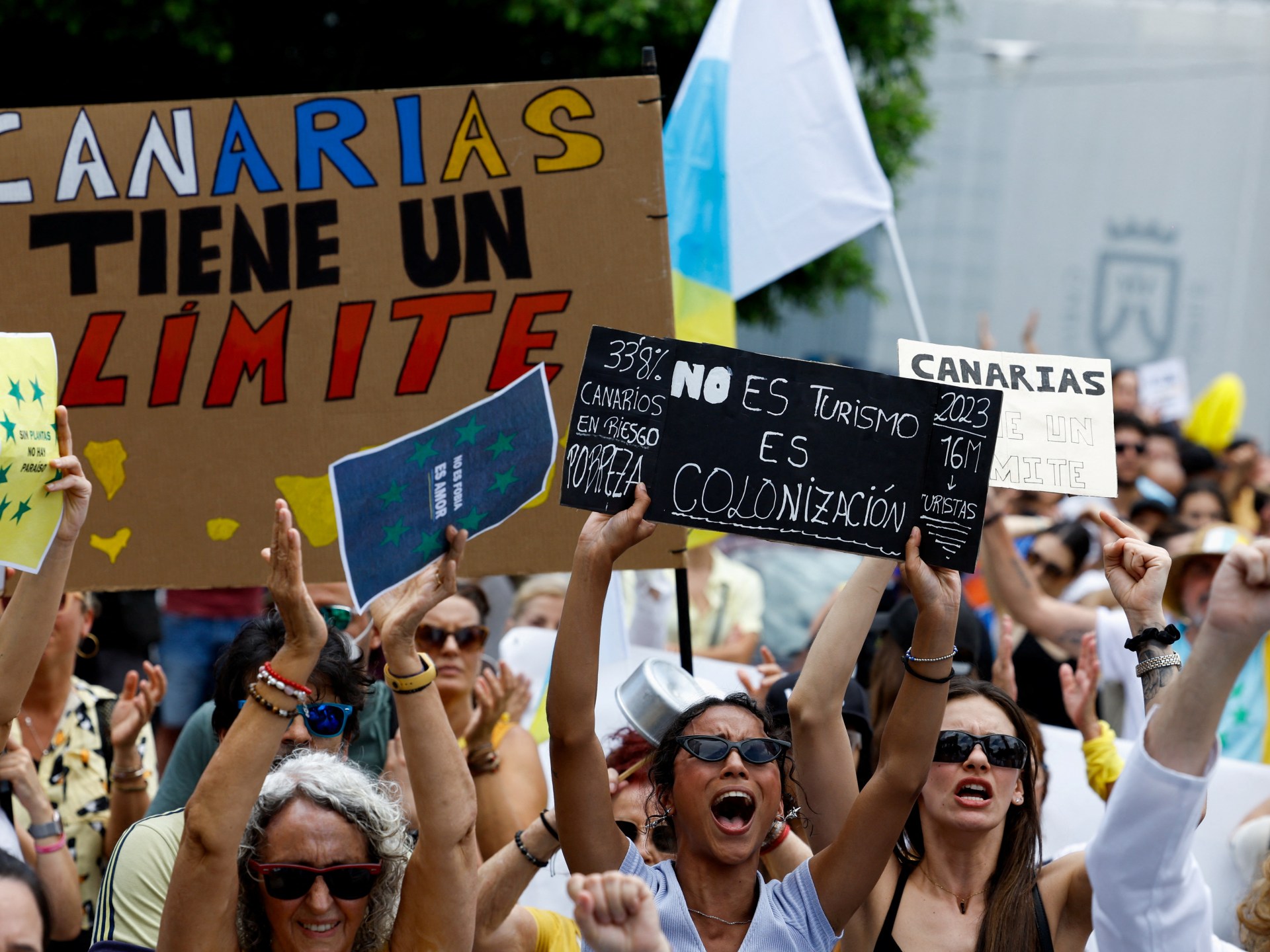Thousands protest against over-tourism in Spain’s Canary Islands

Demonstrators say mass tourism is overwhelming the Atlantic archipelago.
Tens of thousands of demonstrators have hit the streets of Spain’s Canary Islands to demand changes to the model of mass tourism they say is overwhelming the Atlantic archipelago.
An estimated 57,000 people joined the protests, which began at midday (11:00 GMT) on Saturday, Spanish media reports said, citing the central government’s representative in the islands.
Flag-waving crowds packed the streets of the main towns across all of the archipelago’s seven islands, chanting and whistling, and holding placards with slogans like: “The Canary Islands are not up for sale!”; “A moratorium on tourism”; and “Respect my home”.
“It’s not a message against the tourist, but against a tourism model that doesn’t benefit this land and needs to be changed,” one of the protesters told the Reuters news agency during the march in Tenerife’s capital, Santa Cruz de Tenerife.
Smaller marches were held elsewhere in the island group and other Spanish cities, all of them organised by about two dozen environmental organisations ahead of the peak summer holiday season.
The protests were called by some 20 social and environmental groups who say tourist overcrowding perpetuates an economic model that harms local residents and damages the environment.
They want the authorities to limit the number of visitors and have proposed introducing an eco-tax to protect the environment, a moratorium on tourism and a clampdown on the sale of properties to non-residents.
“The authorities must immediately stop this corrupt and destructive model that depletes the resources and makes the economy more precarious. The Canary Islands have limits and people’s patience [does], too,” Antonio Bullon, one of the protest leaders, told Reuters.
‘We can’t keep looking away’
The archipelago of 2.2 million people was visited by nearly 14 million foreign tourists in 2023, up 13 percent from the previous year, according to official data.
Authorities in the islands are concerned about the impact on locals. A draft law expected to pass this year – one that toughens the rules on short lets – follows complaints from residents priced out of the housing market.
Canary Islands President Fernando Clavijo said on Friday that he felt “proud” that the region was a leading Spanish tourist destination, but acknowledged that more controls were needed as the sector continues to grow.
“We can’t keep looking away. Otherwise, hotels will continue to open without any control,” he told a press conference.
Anti-tourism protests have multiplied in recent months across Spain, the world’s second-most visited country, prompting authorities to try to reconcile the interests of locals and a lucrative sector that accounts for 12.8 percent of Spain’s economy.
The Canary Islands, which lie off the northwestern coast of Africa, are known for their volcanic landscapes and year-round sunshine attracting millions of visitors every year, with four in 10 residents working in tourism – a sector that accounts for 36 percent of the islands’ gross domestic product (GDP).
Before the coronavirus pandemic brought the global travel industry to its knees in 2020, over-tourism protest movements were already active in Spain, notably in Barcelona.
After travel restrictions were lifted, tourism surged, with Spain welcoming a record 85.1 million visitors last year.
Related
Turkish Airlines and Qatar Airways Suspend Mogadishu Flights Following US…
Home » Airlines News of Qatar » Turkish Airlines and Qatar Airways Suspend Mogadishu Flights Following US Embassy Terror Alert, Raising Security Concerns at
Local tourism destinations grow fast
Men sit at the Doha Corniche backdropped by high buildings in Doha on March 3, 2025. Photo by KARIM JAAFAR / AFP DOHA: Local tourism destinations are g
Hajj, Umrah service: Qatar Airways introduces off-airport check-in for pilgrims
Image credit: Supplied Qatar Airways has introduced an off-airport check-in
IAG, Qatar Airways, Riyadh Air, Turkish Airlines, Lufthansa & more…
Turkish Airlines – a Corporate Partner of the FTE Digital, Innovation & Startup Hub – is charting a course to rank among the top 3 global airlines for












